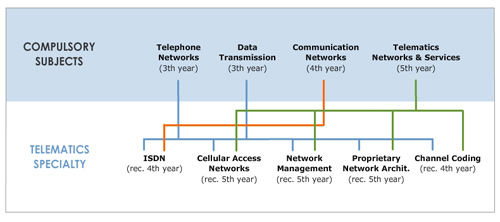
- Presentation
- Staff
- Location
- Contact

- Presentation
- Subjects
- Postgraduate
- Master Degree Thesis

- Presentation
- OTTIUC
- Wireless Communications
- Network Planning
- Applications and Services
- Projects
|
|
|
|
TEACHING: PresentationTeaching activities of the Network Planning and Mobile Communications Laboratory is mainly focused on the two degrees in which is has some responsibility: Telecommunications Engineering (5y) and Technical Telecommunications Engineering Esp. Electronic Systems (3y) – the recent deployed Computer Engineering will be added on the 2008/2009 year. On the other hand, it also actively participates in different postgraduate programs, amongst which an inter-university master degree on information technologies for mobile networks can be highlighted, since it gas a quality mention, given by the Spanish Education Ministry. Furthermore, the Group members have also taken part in different specialization courses, coordinated by different institutions as well as, additionally, have been involved in the coordination of several Summer Courses, within the framework provided by the University of Cantabria every year. At the moment, the Network Planning and Mobile Communications Laboratory, is responsible for a number of courses, belonging either to:
The national compulsory courses are defined by the Universities Conceal within the generic directives of the degree, and they must provide at least 30% from the total of first cycle credits and 25% from the total of second cycle. They specify basic contents, applicable to all the universities, thus warranting the degree validity all over the national ambit. On the other hand, the university courses are defined individually by each university, which may also be as follows::
Within such offer, the NPMCL is in charge of the following subjects: TELECOMMUNICATIONS ENGINEERING :
TECHNICAL TELECOMMUNICATIONS ENGINEERING (SP. ELECTRONIC SYSTEMS):
In the Telecommunications Engineering degree, where the NPMCL mainly offers all its teaching load, the received knowledge through the compulsory subjects makes possible that students are able to attend the rest of the subjects that belong to the Telematics Specialty. The next block diagram shows the relationship between the compulsory subjects and the optional ones contained within the Telematics Specialty. 
In order to adapt to the new directives imposed by the Bolonia Process, teaching has undergone through different changes, some of them affecting postgraduate teaching activities. In this sense, the Group has strengthened its participation in two Master programs, with the main goal of ensuring the excellence. The first one, which comes from a former PhD program, is endorsed by the quality mentioned given by the Spanish Ministry of Education, and involves a number of universities which provide their expertise on information technologies for mobile communications; this one is the choice for those people willing to take their PhD within the Group. On the other hand, we are also in charge of the technological part (Communication and Internet related module) on an eBusiness program, in collaboration with other departments within the University of Cantabria, as well as with the industry. |
|||||||||||||||||||||||||||||||||||||||||||||||